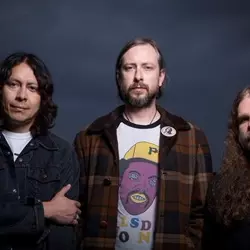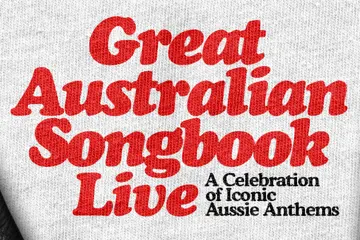 Earthless
EarthlessIt bears repeating: don’t call psychedelic riff monsters Earthless ‘stoner rock’. At least not in earshot of guitarist Isaiah Mitchell. “The thing that I’m always sick and tired of, I just think it’s fucking stupid, is that ‘stoner rock’ thing,” Mitchell spits. “No offence to anyone in any of those bands, but I hate that name, and I’m not a big fan of that style and approach. It doesn’t do anything for me. I know I shouldn’t care about what other people think, or how they label us; people can call us whatever they want. But I just find that music so boring, it’s just the same sounds regurgitated over and over.”
It’s a moment of genuine rock-interview ire from an otherwise mellow fellow. Mitchell lives, these days, “30 or 40 miles north of San Francisco”, on a property with horses and cows. He goes to bed around 8pm, and rises between 5am and 6am. It’s a nice counter to the time he spends touring with Earthless.
The band were formed in San Diego, in 2001. Mitchell had been playing in bands since he was 14, and drummer Mario Rubalcaba was playing in Rocket From The Crypt and Hot Snakes. But, from the beginning, the trio — rounded out by bassist Mike Eginton — felt like they’ve found something permanent.
“We wanted to have musical freedom, spontaneity, improvisation; our very first band practices we were just jamming, 100% improv,” Mitchell recalls. “After the first show, I thought [this] was it. After we finished our set, Mario came up to me and said: ‘That was super fun, let’s do it again.’ That was all the affirmation I needed. But, then, club owners would keep putting us on bills, just at local San Diego shows, with bands we really loved: Acid Mothers Temple, High On Fire, Mastodon. We played over Mastodon, that’s how long ago that was. It was nice that people gave us something to do, encouraged us, kept booking us. The first time we ever went to San Francisco, Al [Cisneros] from OM and Sleep was waiting on the curb when we pulled up to help us load in. He was a fan, and so it was like: ‘This is cool, we should keep doing this.’”
“We don’t conceptualise things too much. Someone has an idea, and then we play it."
Don't miss a beat with our FREE daily newsletter
In the many years since, Earthless has “gone a lot further than [they] ever thought it would”. They released five LPs — from 2005’s Sonic Prayer to 2018’s Black Heaven — that’ve showed they are a band unafraid of changing. Where their early records were long, exploratory instrumental pieces, recently they’ve been delivering more concise songs, with Mitchell’s vocals occupying a bigger place in the mix.
“I’d like it if all our albums were like our first records, just two long instrumentals, jamming. But, we can’t plan it, it’s just whatever comes natural,” Mitchell says. “We don’t conceptualise things too much. Someone has an idea, and then we play it, and play it until we can get inside it really well, get towards what’s important. Like: what are the best elements of a riff? Of a section? Of a song? Really getting inside of it, seeing what can be done with it.”
Really getting inside of a song is the hope for Earthless live shows, where their repetition and improvisation can lead the musicians into almost trance-like states. “Getting to a point where you’re forgetting yourself, getting out of what’s comfortable, heading out into new and uncharted territories,” offers Mitchell. “That’s where all the magic is.”
When they’re playing, Mitchell is often conjuring, and navigating, mental images and landscapes. “I’m usually thinking of a beach that I love going to, playing to the ocean,” he offers. “Or a sunset, or my house, looking at the cows and the horses. Or you think of someone you love, someone who’s passed away. Or you think about the fucked-up shit that’s going on in the world. People that you wish would die. I’m not really that cruel a guy, but there’s a lot of people I think should go to hell. It’s good to think that way, it makes things more interesting. When you’re performing improv, the more that you can evoke imagination and emotion inside of you, the more that influences what you play.”















